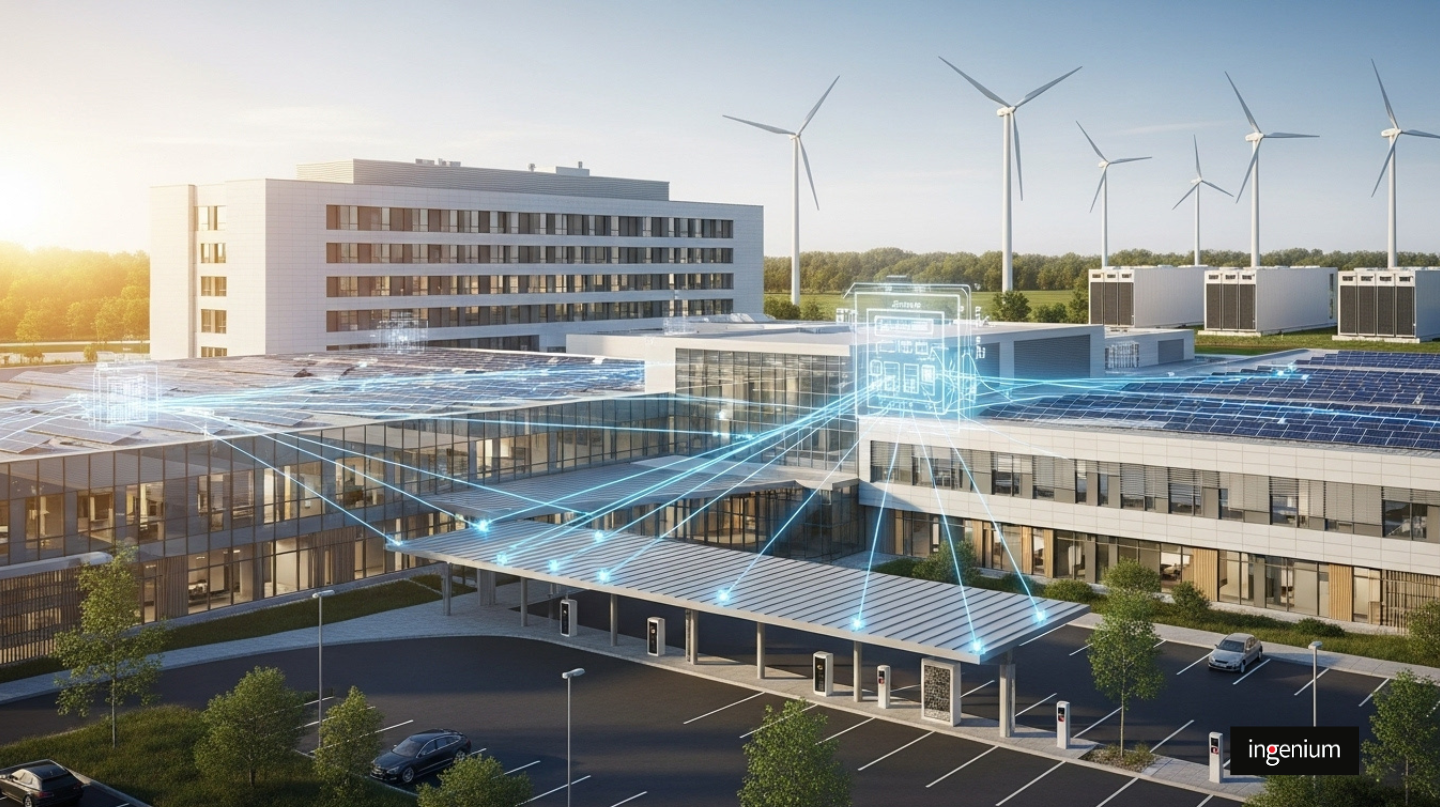.png)
Energy plan or energy audit is a mandatory task for many hospitals

With the entry into force of the new (strengthened) regulations for enterprises from the end of 2022, organizations are required, now more often than before, to have a conforming declared Energy Plan or Energy Audit. Hospitals are also mostly covered by these new regulations.
Indeed, the scope has greatly expanded and the thresholds for such a plan or audit have also changed significantly:
- > 0.1 PJ of final energy consumption per year for an Energy Plan
- > 0.05 PJ final energy consumption per year for an Energy Audit
- > 0.02 PJ of final energy consumption per year for an Energy Balance
Last year, Ingenium already assisted a number of hospitals in drawing up their energy plan or energy audit. We will gladly guide you through the consequences for your hospital.

WHAT IS THE LEGAL FRAMEWORK AROUND ENERGY POLICY?
The strengthened regulations for companies came into force at the end of 2022. Since 2023, therefore, many companies must comply with a number of obligations around energy reporting.

Energy-intensive companies consuming more than 0.1 PJ of final energy per year already had to have a conforming Energy Plan by the end of 2022. The Energy Plan will also have to be updated every 4 years.
These regulations also added the requirement for an energy audit. Companies, including many hospitals, that consume more than 0.05 PJ of final energy per year must have an energy audit as of April 2023. This audit must also be updated every 4 years.
In addition, all large companies (> 250 FTE OR annual turnover > 50 million € and balance sheet total > 43 million €) - regardless of their energy consumption - must also have an energy audit since April 1, 2023.
Enterprises with final energy consumption between 0.02 and 0.05 PJ must prepare an Energy Balance Sheet and update it every four years.
WHAT DOES 0.1 PJ OF FINAL ENERGY CONSUMPTION MEAN?
The limit of 0.1 PJ final corresponds approximately to an electricity consumption of 27,800 MWh. Final energy consumption is determined by summing all energy consumption. Thus, if the annual consumption for your hospital is near or greater than half of the above energy uses (e.g., 15,000 MWh of electricity and 15,000 MWh of natural gas), chances are your hospital will need to have an energy plan prepared.
If your consumption is near 7,500 MWh of electricity and 7,500 MWh of natural gas, your company will need to have an energy audit.
WHAT IS AN ENERGY PLAN ?
An energy plan contains a list of measures that can reduce your hospital's specific energy consumption. All measures on this list that have an internal rate of return (IRR) of at least 13% after taxes must be implemented within three years at the latest. These are usually energy-saving measures with a payback period of less than five years. For those measures with a longer payback period, the choice can be made to still commit to implementing them as a hospital.
A hospital submits its energy plan for compliance to the Flemish Energy and Climate Agency (VEKA), which then evaluates the energy plan.
WHAT IS AN ENERGY AUDIT ?
An energy audit is similar to an Energy Plan and includes an overview of the buildings energy use profile and a list of measures that can reduce energy consumption in your hospital. Again, all measures on this list that have an internal rate of return (IRR) of at least 13% after taxes must be implemented within three years at the latest. These are usually energy-saving measures with a payback period of less than five years. For the measures with a longer payback period, the choice can be made to still commit to implementing them as a hospital.
The energy audit must be entered on a web application of the Flemish Energy and Climate Agency (VEKA), which then evaluates the energy audit.
ANY OTHER OBLIGATIONS A HOSPITAL MUST MEET?
A lot has changed regarding the new regulations for large energy consumers. These include hospitals, which must comply with various obligations. We list them here for you:
- Public institutions, including hospitals, are required to have an EPC-NR as of Jan. 1, 2024.
- Since June 25, 2023, buildings with electricity consumption > 1,000 MWh/year / EAN connection have been required to install solar panels. This mandatory amount of kWp depends on the amount of roof area
- A Climate Plan is mandatory for large enterprises (SME definition) and/or energy-intensive (> 0.1PJ energy consumption) enterprises applying for support. This Climate Plan describes how the relevant establishment of the company will make the transition towards a low carbon business operation in a climate neutral Europe in 2050, taking into account the objectives of the Flemish Energy and Climate Plan.
As there are many synergies in the studies concerning these energy obligations, Ingenium can combine these studies in one integrated energy study. This way, your hospital has the legally required energy plan / energy audit and the required EPC-NR certificate at its disposal in one study, including a step-by-step plan for the roll-out of solar panels checked against the legal obligations.
Would you have liked more info for your hospital and the obligations you need to meet? Contact our expert Nico Vandewiele at nico.vandewiele@ingenium.be or call 050 40 45 30.
Downloads
Related news items
.png)
.png)
How a master plan creates electricity certainty and added value

